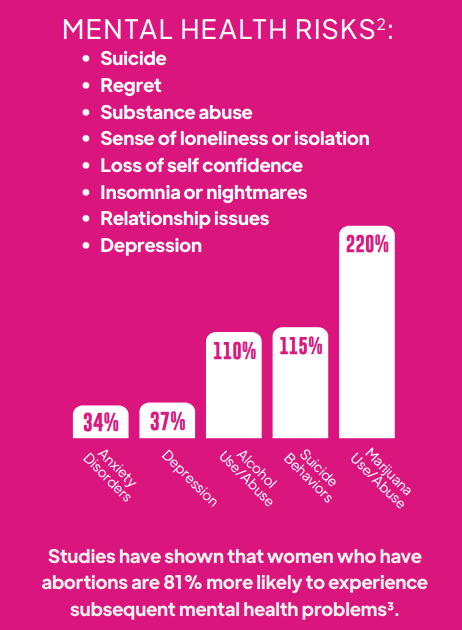Abortion Risks to Mental Health
Abortion heightens the risk of mental health issues with studies showing that women are 34% more likely to develop anxiety disorders, 37% more likely to develop depression, 110% more likely to rely on alcohol use or abuse, 115% more likely to develop suicidal behavior, and 220% more likely to take on marijuana use or abuse.
As many as 60% of women having an abortion experience some level of emotional distress afterwards. In 30% of women, the distress is classified as severe.(Hanna Soderberg, European Journal of Obstetrics & Gynecology and Reproductive Biology, 1998)
A recent literature review concluded abortion is a risk factor for “mood disorders substantial enough to provoke attempts of self-harm.”(John Thorp, Obstetrical and Gynecological Survey, 2003)
Women who ended their first pregnancy by abortion are five times more likely to report subsequent substance abuse than women who carried the pregnancy to term and four times more likely to report substance abuse compared to those whose first pregnancy ended naturally.(David Reardon, American Journal of Drug and Alcohol Abuse, 2000)
Abortion Risks to Physical Health
The medical community broadly recognizes these abortion risks:
Risks if the abortion goes as planned:
- Heavy or persistent bleeding
- Damage to cervix
- Abdominal pain or cramping
- Scarring of uterine lining
- Breast cancer
- Future premature birth(s) or miscarriages
Risks if things go awry:
- Infection or sepsis
- Placenta Previa
- Perforation of uterus
- Damage to other organs
- Death
Women face a number of possible physical complications as a result of legal abortion including hemorrhage requiring transfusion, perforation of the uterus, cardiac arrest, endotoxic shock, major unintended surgery, infection resulting in hospitalization, convulsions, undiagnosed ectopic (tubal) pregnancy, cervical laceration, uterine rupture, and death.(Warren Hern, Abortion Practice, 1990, p. 175-193.)
All women, especially young teenagers, are at risk for damage to their cervix during an abortion, which can lead to complications with later pregnancies.(Kenneth Schultz, The Lancet, 1983)
“Complications such as bleeding in the first and third trimesters, abnormal presentations and premature rupture of the membranes, abruptio placentae, fetal distress, low birth weight, short gestation, and major malformations occurred more often among women with a history of two or more induced abortions.”(Shari Linn, American Journal of Obstetrics and Gynecology, 1983)
Abortion can increase your chance of having an ectopic (or tubal) pregnancy in the future.(Anna Kalandidi, British Journal of Obstetrics and Gynecology,1991.
Abortion and Breast Cancer
- In 2014, the journal “Cancer Causes Control” concluded that just one abortion increased the risk of breast cancer by 44%.
- Induced Abortion (IA) prior to 32 weeks increases the risk of breast cancer due to the disruption of natural maturation of breast cells.
- 89% of abortions happen prior to 12 weeks, before the cancer-vulnerable lobules (Type 1 & 2) have begun to differentiate into the cancer-resistant lobules (Type 3 & 4).
- 99% of breast cancers arise in Type 1 and 2 lobules. Induced abortion leaves women with an abundance of cancer vulnerable Type 2 lobules.
Abortion can increase your risk for breast cancer. A review analyzing 23 studies on breast cancer and abortion identified 17 of those studies indicate an increased risk of breast cancer among women having an abortion.(Joel Brind, Journal of Epidemiology and Community Health, 1996). For more information on this topic, go to www.abortionbreastcancer.com and www.bcpinstitute.org.
Existing evidence of an abortion-breast cancer connection prompted the New England Journal of Medicine to publish a February 2000 review of breast cancer research, which lists abortion as a risk factor.(Katrina Armstrong, “Assessing the Risk of Breast Cancer,” New England Journal of Medicine, Vol 342, No.8, 2000, subscription required).
122 Studies from 1960s to Present: Relationship Between Abortion and Premature Births

